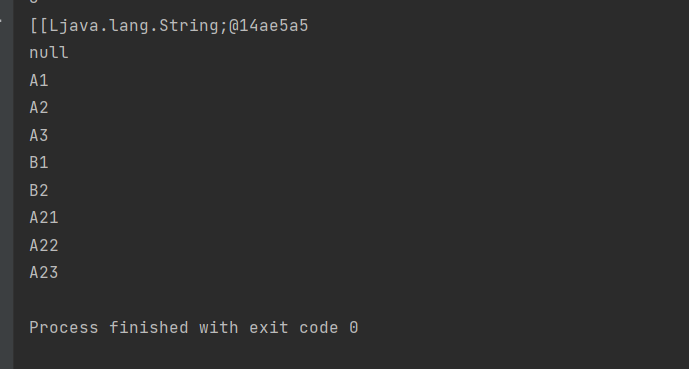变量
一、基本数据类型
- boolean(布尔值):
boolean bool1 = true;
boolean bool2 = false;
System.out.println(bool1);
System.out.println(bool2);
bool1 = false; //变量重赋值
System.out.println(bool1); - byte(整数):
byte b1 = 100;
byte b2 = 120;
System.out.println(b1);
System.out.println(b2); - short:
short s2 = 10000;
int i1 = 10;
int i2 = 0;
long l1 = 1;
//long l2 = 922337303685477; java中默认是int,超出int范围报错
//long l3 = 922337203685477l; java中加L,表示是Long类型,不报错
long l4 = 9223372036854778l;
System.out.println(b1);
System.out.println(b2);
System.out.println(s1);
System.out.println(s2);
System.out.println(i1);
System.out.println(i2);
System.out.println(l4); - int-Integer:
- long
- float(浮点数、小数):
//float fa = 3.14; // 此操作报错,java中输入小数默认是double类型,不可以赋值给float,double范围比float大,java中不允许大值赋值给小的数据类型,需要加f或者F
float f2 = 3.14f;
float f3 = 3.14F;
System.out.println(f2); - double:
double f4 = 3.145D;
double f5 = 3.14; // double一般不加
System.out.println(f5); - char-Character
二、引用数据类型
引用数据类型:引用数据类型是地址值,基本数据类型是具体的值
1、String(字符串):
//单引号 是 字符类型 char 'a'
//双引号 是 字符串类型 String
String str1 = "java 学习";
System.out.println(str1);
str1 = "";
System.out.println(str1);

2、一维数组:
数组描述一组具有相同意义的数据类型
(1)动态和静态初始化、length、取值、赋值、索引越界
int[] arry = {1, 2, 3};
System.out.println("arry数组的地址值为:" + arry);
System.out.println("arry数组的长度为:" + arry.length);
System.out.println("索引为0的数据为:" + arry[0]);
arry[1] = 100;
System.out.println("重新赋值后的arry[1]:" + arry[1]);
int[] arry2 = new int[5];
System.out.println("动态创建数组:" + arry2);
System.out.println("动态创建数组arry2[0]值为:" + arry2[0]);
arry2[4] = 1000;
System.out.println("赋值后arry2[4]的值为:" + arry2[4]);
System.out.println("下标索引越界:" + arry2[5]);

(2)空指针异常:NullPointerException,访问了为null的数据类型的内容
int[] arry3 = null;
System.out.println("空指针异常:" + arry3[0]);

3、二位数组
1. 静态初始化:数据类型[][] 数组名 = {{值1,值2,},{值1,值2},{值1,值2}};
String[][] zhubos = {
{"李佳琪", "薇娅", "罗杰"},
{"罗永浩", "金星"},
{"张三", "李四", "王二麻子"}};
System.out.println(zhubos);
System.out.println(zhubos[0]);
System.out.println(zhubos[0][2]); // 罗杰
zhubos[0][2] = "海贼王";
System.out.println(zhubos[0][2]); // 海贼王
System.out.println(zhubos.length); // 6

// 2. 动态初始化:数据类型[][] 数组名 = new 数据类型[二位数组的长度][];
String[][] zhubos2 = new String[3][];
System.out.println(zhubos2);
System.out.println(zhubos2[0]);
zhubos2[0] = new String[3];
zhubos2[0][0] = "A1";
zhubos2[0][1] = "A2";
zhubos2[0][2] = "A3";
System.out.println(zhubos2[0][0]);
System.out.println(zhubos2[0][1]);
System.out.println(zhubos2[0][2]);
zhubos2[1] = new String[2];
zhubos2[1][0] = "B1";
zhubos2[1][1] = "B2";
System.out.println(zhubos2[1][0]);
System.out.println(zhubos2[1][1]);
zhubos2[2] = new String[3];
zhubos2[2][0] = "A21";
zhubos2[2][1] = "A22";
zhubos2[2][2] = "A23";
System.out.println(zhubos2[2][0]);
System.out.println(zhubos2[2][1]);
System.out.println(zhubos2[2][2]);





 浙公网安备 33010602011771号
浙公网安备 33010602011771号